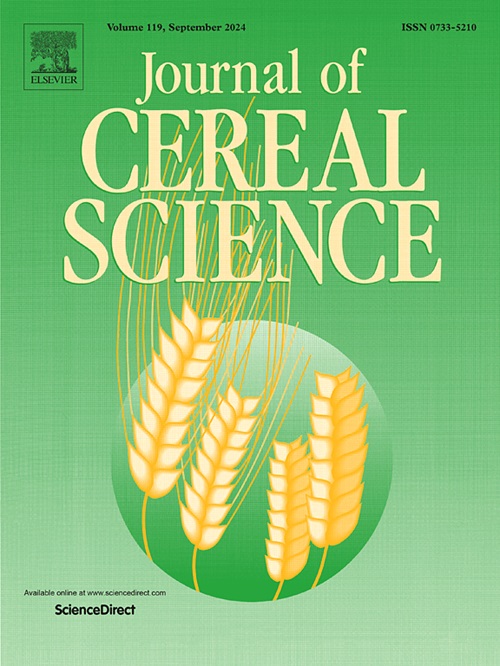The anti-inflammatory and anti-cancer effects of tartary buckwheat sprouts in lipopolysaccharide-stimulated macrophage (RAW264.7) cells and lung (H1975) cells
IF 3.7
2区 农林科学
Q2 FOOD SCIENCE & TECHNOLOGY
引用次数: 0
Abstract
Tartary buckwheat (Fagopyrum tataricum), known for its resilience and higher levels of bioactive compounds particularly rutin, is a group of pseudocereals of the genus Fagopyrum in the Polygonaceae family. During germination, enzymatic activity in tartary buckwheat sprouts converts bound forms of flavonoids (like rutinosides) into free rutin, and increases its bioavailability. Rutin is a versatile flavonoid with broad-spectrum benefits for cardiovascular, metabolic, neurological, and immune health. Tartary buckwheat sprouts are a potent natural source of rutin, leveraged for their enhanced bioactive profile through germination. This positions them as a valuable functional food, with research continuing to explore optimal cultivation and processing methods to maximize health benefits. Obtaining sprouts rather than grains has the advantages of life cycle shortening and being eco-friendly during cultivation. The methanolic extract of tartary buckwheat sprouts (MESP) was prepared and compared with MES (methanolic extract of tartary buckwheat seeds) to explore its bioactivities. The results show that the content of rutin can reach 32 mg/g dry weight. In LPS-exposed to RAW264.7 macrophages, MESP inhibits the transforming growth factor β (TGFβ), IL-1β, and IL-6 release. MESP exhibited higher anti-inflammatory potential than that of MES. We firstly demonstrated that its suppression was manipulated via AKT/p-38/TGFRII signaling. MESP impaired the growth of H1975 lung cancer cells. Its inhibition was through FAK/AKT/ERK34 signaling. The facts of tartary buckwheat sprouts possessing dual functions of anti-inflammatory and anti-cancer activities suggested tartary buckwheat sprouts are a valuable source to be of functional food.
苦荞芽对脂多糖刺激巨噬细胞(RAW264.7)细胞和肺(H1975)细胞的抗炎和抗癌作用
苦荞(Fagopyrum tataricum)是蓼科苦荞属(Fagopyrum tataricum)的一组假谷物,以其弹性和较高水平的生物活性化合物(特别是芦丁)而闻名。在萌发过程中,苦荞芽中的酶活性将结合形式的类黄酮(如芦丁苷)转化为游离的芦丁,并增加其生物利用度。芦丁是一种用途广泛的类黄酮,对心血管、代谢、神经和免疫健康有广泛的益处。苦荞芽是芦丁的一个有效的天然来源,杠杆为其增强的生物活性剖面通过发芽。这使它们成为一种有价值的功能性食品,研究继续探索最佳的种植和加工方法,以最大限度地提高健康效益。在栽培过程中,获得芽而不是籽粒具有缩短生命周期和环保的优点。制备苦荞麦芽甲醇提取物(MESP),并与苦荞麦种子甲醇提取物(MES)进行比较,探讨其生物活性。结果表明,芦丁含量可达32 mg/g干重。在lps暴露于RAW264.7巨噬细胞中,MESP抑制转化生长因子β (TGFβ)、IL-1β和IL-6的释放。MESP表现出比MES更高的抗炎潜能。我们首先证明其抑制是通过AKT/p-38/TGFRII信号调控的。MESP可抑制H1975肺癌细胞的生长。其抑制作用是通过FAK/AKT/ERK34信号传导。苦荞芽具有抗炎和抗癌的双重功能,是一种有价值的功能性食品。
本文章由计算机程序翻译,如有差异,请以英文原文为准。
求助全文
约1分钟内获得全文
求助全文
来源期刊

Journal of Cereal Science
工程技术-食品科技
CiteScore
7.80
自引率
2.60%
发文量
163
审稿时长
38 days
期刊介绍:
The Journal of Cereal Science was established in 1983 to provide an International forum for the publication of original research papers of high standing covering all aspects of cereal science related to the functional and nutritional quality of cereal grains (true cereals - members of the Poaceae family and starchy pseudocereals - members of the Amaranthaceae, Chenopodiaceae and Polygonaceae families) and their products, in relation to the cereals used. The journal also publishes concise and critical review articles appraising the status and future directions of specific areas of cereal science and short communications that present news of important advances in research. The journal aims at topicality and at providing comprehensive coverage of progress in the field.
 求助内容:
求助内容: 应助结果提醒方式:
应助结果提醒方式:


